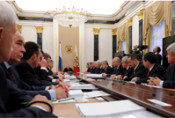
President of Russia: Security Council Meeting in Kremlin
Vladimir Putin held a Security Council meeting on countering national security threats in the information sphere.
Measures to improve protection of Russia’s communications networks and information resources and guarantee stable operation of the Russian segment of the internet were the main subjects of discussion.
Today, we will discuss issues concerning protection of Russia’s information space from modern threats.
This is a priority area in our efforts to ensure national security today. Reliable operation of our information resources and control and communications systems is vitally important for our national defence capability, a steadily growing economy and social sector, and for protecting our sovereignty in the broadest sense of the term.
We have already taken some important steps to ensure Russia’s information security over these last years. We have a comprehensive strategic document in place – the Information Security Doctrine. Starting last year, we began setting up a state system to detect, prevent and liquidate the consequences of computer attacks against Russia’s information resources. We are establishing modern, protected communication networks and systems for our defence and security needs and for the law enforcement agencies’ effective operation.
But at the same time, we need to take into account the risks and threats that exist in the information sphere. We see that some countries are attempting to use their dominance in the global information space to pursue not only economic but also military and political objectives. They make active use of information systems as an instrument of so-called ‘soft power’ to achieve their goals.
First, we need to improve the protection level of Russia’s communications networks and information resources, above all the networks used by our government bodies. We must prevent any unlawful interference in their work and also prevent leaks of confidential and personal information.
Second, we need to ensure stable operation and security of the Russian segment of the internet. Let me make it clear here that we have no plans to restrict internet access or put the internet under total control, put in the state’s hands or restrict the lawful interests and possibilities of people, public organizations, and business in the information sphere.
A third area for work is to develop home-grown technology, equipment and information products. We need to take steps at the same time to encourage government bodies and Russian companies to use these products. Our agencies have been set objectives in this area. I would like to hear the Security Council members’ opinions on priority measures in this area today.
Finally, we need to expand our cooperation with global and regional organizations on guaranteeing international informational security. I think that the United Nations and its relevant groups and specialized agencies should act as one of the platforms for assessing risks and drawing up joint measures on information security and analyzing the legal consequences of such measures.

